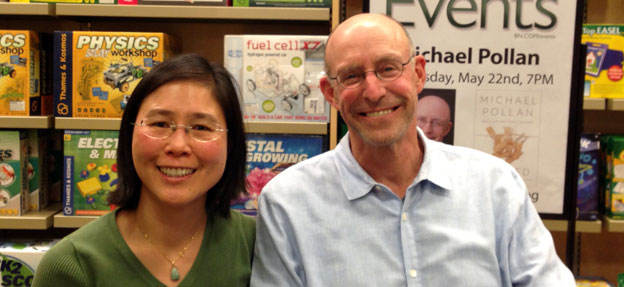Cooks are modern-day alchemists and mages. We are sensualists, spiritual pilgrims, and death-defying stuntmen. We are healers, change agents, and activists. Our day-to-day routines may obscure these awesome truths, but Michael Pollan’s latest book, Cooked: A Natural History of Transformation (Penguin, 2013), is a heartening reminder. In the second half of May, I had the pleasure of hearing Pollan twice—once in a radio interview, and then live at a book signing in the San Francisco Bay Area—as he “entice[d] people into the kitchen by showing them how interesting and pleasurable it can be.” Of course, with Cozy Foodies, he is preaching to the choir, but he sure has a knack for connecting the dots between good food and cooking, and just about everything that is (or should be) central to living well.
Frankly, I like the idea of a little sorcery in my everyday life. But to become adept at transforming those lumps of leaden raw ingredients into golden morsels of food, you need a few more things. Pollan draws an analogy between cooking and doing yoga: both require patience, practice, and presence. I don’t do yoga (Ssh. Don’t tell anyone! They’ll take away my license to live in the Bay Area!), but sometimes I do a mindful breathing exercise, and—man!—it’s hard to keep your mind only on breathing. Every seventeen seconds or so, my mind shifts to thinking about the worry du jour or the obsession of the moment. But, on good days, cooking is like meditating: I become solely focused on the activity of dicing and slicing, and everything else melts away. My brain quiets down; I’m calm and relaxed. The activity of cooking can be, in and of itself, a moment of living well.
Living well means coming to terms with death. Cooking means that I must grapple with death: as an omnivore graphically contemplating the animal who gave its life to nourish me, but also in the act of fermentation, which Pollan piquantly calls “the management of rot.” It’s not polite, but it is true. Thinking about rot and other earthy topics isn’t comforting when I bite into a well-matured piece of cheese that’s been hiding in the back corner of my deli drawer (I sure hope that was Gorgonzola!). Understanding fermentation, however, adds an extra layer of interest and depth to things like bread, beer, or yogurt. And when I really pause to allow the thought to percolate, it’s also a spiritual one too, in an “ashes to ashes” kind of way. Do you know what I mean?
By now, people’s eyes tend to glaze over when they hear that making more home cooked meals is an important way to take charge of our health or to strengthen our family bonds, so I won’t gnaw on that old bone again. But cooking is also a way to take part in “maker” culture, the D.I.Y. movement—it’s hip and fashionable! Who doesn’t want to be more in control of their lives? By making our own food more of the time, we challenge the balance of power between corporate food producers and ourselves when we cook. As Pollan notes, we don’t outsource our workouts and hobbies; why should we outsource so much of our cooking, an activity that is essential to better health and can be a source of deep satisfaction?
Many of these Big Ideas have knocked around in the old thinker at one point or another, so it’s affirming to have them displayed beautifully like a bouquet of roses. There is so much upside to cooking for ourselves; I’m ready to roll up my sleeves and do some magic! How about you?


